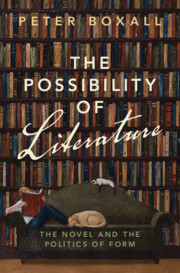Introduction
The Possibility of Literature
Published online by Cambridge University Press: 10 October 2024
Summary
This introduction offers a theoretical model for reading the relation between the conditions that determine the possibility of literary expression, and those possibilities that literature itself invents. It is in the relation between these two forms of possibility, the introduction argues, that the politics of literary form resides.
The last two decades of critical thinking have seen a quite radical shift in our understanding of this relationship. The introduction traces these shifts, and places the essays collected in this volume (written over that two decade period) in the context of such theoretical and political transformations. The passage of literary thinking in the current century, the introduction argues, requires a new critical understanding of literary possibility, which it is the task of these essays to perform.
- Type
- Chapter
- Information
- The Possibility of LiteratureThe Novel and the Politics of Form, pp. 1 - 26Publisher: Cambridge University PressPrint publication year: 2024

